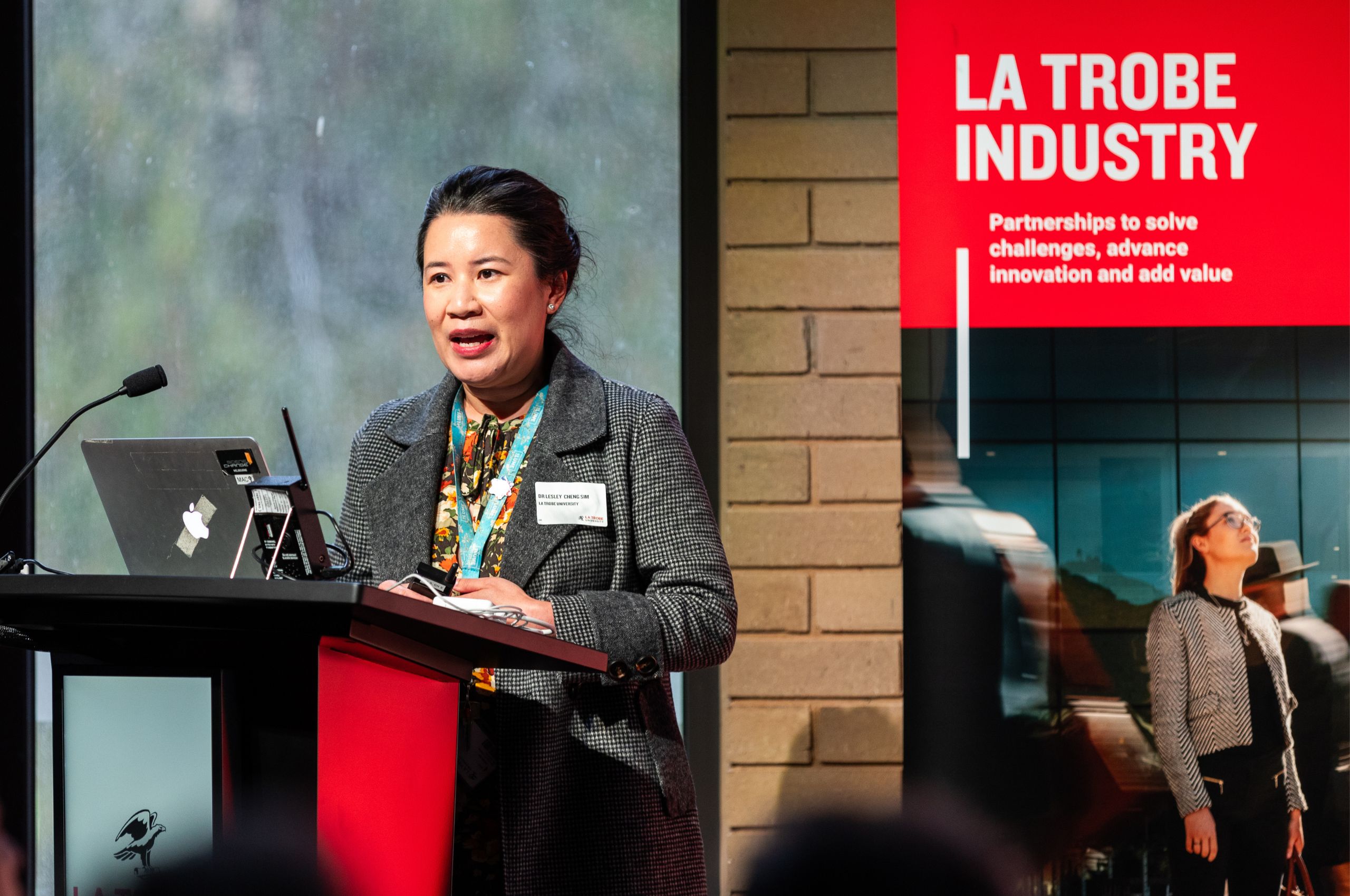Pioneering disease-fighting cell technology

Industry partnership power works both ways.
At a glance
- Australian biotech company VivaZome Therapeutics' partnership with La Trobe University helps fund mission to pioneer next-generation manufacturing pipelines for advanced therapies.
- Dr Lesley Cheng and her colleagues are contributing technical expertise from their work in the relatively new field of exosomes, to harness them as carriers of therapeutic cargo to improve disease treatment and enhance patient outcomes.
- Dr Cheng and her team are international leaders in exosome research, and their energy and visibility – at conferences and through numerous publications – have attracted the attention of industry partners like VivaZome.
Being approachable and generous are key qualities for building effective industry collaborations, says Dr Cheng.
Case study
With her PhD completed, molecular and cell biologist Dr Lesley Cheng was preparing for a “traditional” career in academic research when fate intervened. Dr Cheng and her husband took a leap, heading to Dubai for their careers. But when they got there, there were no traditional academic research opportunities for her.
“At that time, Dubai was positioning itself as an international free-trade zone for biotech companies’ research and development,” she explains. “So that’s where I ended up, in research and development, working on blood tests for newborn babies to detect genetic diseases. I saw how it could help in a hospital setting, and it was a rewarding insight into how academic research could be translated and directly impact and benefit society.”
Dr Cheng’s first-hand experience fuels her passion for collaborating with industry partners to propel healthcare innovation forward. On her return from Dubai, Dr Cheng switched to academia and her first Postdoctoral Role was at the University of Melbourne within the laboratory of Professor Andrew Hill, who shared her interest in translatable research. Combining Prof Hill’s work in neurodegeneration in cell models and Dr Cheng’s in diagnostic processes, they developed intellectual property with the potential to enhance the detection of diseases, including Alzheimer’s disease.
In doing so, they found themselves at the forefront of a new field of study. Exosomes are extracellular vesicles – "bubbles" secreted from all types of cells and filled with material that reflect the make-up of the cell from which they originated. Research has already revealed exosomes’ role in cell communication, but they can also pass disease from one to another. Recognising the transformative potential, the global biotech industry hopes to load exosomes with customised therapeutic “cargo” to treat disease.
“The field has been around for about 15 years, and we've been part it for 12,” says Dr Cheng. “We've been lucky, riding a wave in this novel area to become leaders in the field. We’ve published high-impact papers and presented at a lot of international conferences where we’ve met industry partners.”
In 2015, Dr Cheng and Prof Hill took this research to La Trobe Institute for Molecular Science (LIMS) where Dr Cheng is now a Senior Research Fellow and leads a dynamic team engaged in a groundbreaking environment funded project. This collaboration, which includes VivaZome and other partners, aims to pioneer new treatments for conditions such as traumatic brain injury and age-related macular degeneration.
After attending their conference presentations and seeing the remarkable track record of the La Trobe team in the exosome field, VivaZome approached them for technical expertise. This partnership resulted in two three-year Cooperative Research Centres Projects (CRC-P) program grants, with the current funding aimed at supporting the establishment of an exosome manufacturing facility at the Bio Innovation Hub at La Trobe University.
“Industry members come to us based on word-of-mouth because we’ve built a reputation for being approachable and collaborative,” says Dr Cheng. “We’re generous people too, and we maintain relationships that way as well. Those characteristics assist us because a lot of academic-industry partnerships are startups: we’re in a new field, learning together.”
Working with industry gives us an insight into how academic research can impact society, and how we can also improve our research programs to be more applicable to industry and society needs.
Partnership power works both ways. The LIMS collaboration with VivaZome also serves as a valuable learning ground for students and staff, offering rich opportunities and, of course, helping fund their research, fostering a dynamic exchange of knowledge and support between academia and industry.
“Industry engagement also gives me on-the-job training about how industry works as well as access to networks and amazing mentors,” Dr Cheng explains. “When I spin out my own company to commercialise our IP, I will be applying the invaluable experience I’ve gained from industry partnerships such as VivaZome."
Developing a partnership with La Trobe can give your organisation access to the University ecosystem of research, training and education, co-location, entrepreneurship and innovation too.
To explore industry partnership opportunities, connect with the Industry Engagement team at industry.engagement@latrobe.edu.au
